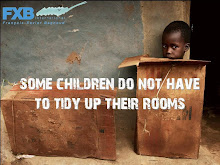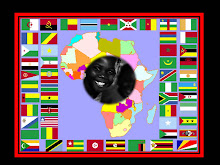Wednesday, March 3, 2010
My African Child
Posted by The Power of One at 6:18 PM 0 comments
Labels: Africa, AIDS, Budgeting for Poverty, famine, Land of Sadness
Sunday, January 31, 2010
Women & Poverty
“Women do two thirds of the world's work. Yet they earn only one tenth of the world's income and own less than one percent of the world's property. They are among the poorest of the world's poor.”
--Barbara B. Conable, Jr.
Source: http://www.americanprogress.org/issues/2008/10/women_poverty.html
Posted by The Power of One at 6:27 PM 0 comments
Labels: Budgeting for Poverty, statistics, Women in Poverty
Wednesday, January 20, 2010
How The World Bank Sees It
Today, I discovered a great site (The World Bank's PovertyNet) that provides a simple and concise definition of global poverty, describes a means to measure poverty, simply explains the trends in poverty, and shares the global goals created to address this issue of poverty. The website is full of data, but it is presented on a level that the everyday Joe can understand. I highly recommend that you spend time on this website as it provides more than just data, it also provides tools and training opportunities to address the global epidemic of poverty.
Here is an excerpt from the site:
"While there has been great progress in reducing poverty, it has been far from even, and the global picture masks large regional differences.
Poverty in East Asia—the world’s poorest region in 1981—has fallen from nearly 80 percent of the population living on less than $1.25 a day in 1981 to 18 percent in 2005 (about 340 million), largely owing to dramatic progress in poverty reduction in China. The goal of halving extreme poverty between 1990 and 2015 has already been achieved in East Asia.
Between 1981 and 2005, the number of people in poverty has fallen by around 600 million in China alone. In the developing world outside China, the poverty rate has fallen from 40 to 29 percent over 1981-2005, although the total number of poor has remained unchanged at around 1.2 billion.
$1.25 a day poverty rate in South Asia has also fallen, from 60 percent to 40 percent over 1981-2005, but this has not been enough to bring down the region’s total number of poor, which stood at about 600 million in 2005.
In Sub-Saharan Africa, the $1.25 a day poverty rate has shown no sustained decline over the whole period since 1981, starting and ending at around 50 percent. In absolute terms, the number of poor people has nearly doubled, from 200 million in 1981 to 380 million in 2005. However, there have been signs of recent progress; the poverty rate fell from 58% in 1996 to 50% in 2005.
In middle-income countries, the median poverty line for the developing world—$2 a day in 2005 prices—is more relevant. By this standard, the poverty rate has fallen since 1981 in Latin America and the Middle East & North Africa, but not enough to reduce the total number of poor.
The $2 a day poverty rate has risen in Eastern Europe and Central Asia since 1981, though with signs of progress since the late 1990s...
The uneven progress of development is worrying. The flows of trade and capital that integrate the global economy may bring benefits to millions, but poverty and suffering persist. Responding to such concerns, governments and international development agencies have begun to reexamine the way they operate. In September 2000, 189 countries signed the Millennium Declaration, which led to the adoption of the Millennium Development Goals (MDGs).
The MDGs are a set of eight goals for which 18 numerical targets have been set and over 40 quantifiable indicators have been identified. The goals are:
While each goal is important in its own right, they should be viewed together as they are mutually reinforcing. Achieving them will require building capacity for effective, democratic, and accountable governance, protection of human rights, and respect for the rule of law. The World Bank will systematically monitor progress in achieving these goals in the countries it assists (see the Millennium Development Goals website for more detail on the MDGs)."
Posted by The Power of One at 4:25 AM 1 comments
Labels: Budgeting for Poverty, Millenium Development Goals, PovertyNet, The World Bank
Wednesday, January 13, 2010
"What would it cost to help just one person hang on?" Not only do I pose this question to you, my readers, but also it's for me, too. Really, I am asking myself this question. What can I, no, SHOULD I do to help just one person or one family in my own city?
I am so blessed. I have money, not alot, but enough to meet and to exceed the basic needs of my family. Perhaps I could choose to give up Pizza Night just ONE time this month to donate the money I would have spent at Papa Johns to the local food bank or other local charity? Maybe if I skipped Starbucks just two times a week for ONE month and put that money where my coffee drinking mouth was, I might actually help someone meet a basic need for her family. Maybe I might help to bring comfort for just one minute.
Poverty is a reality for 1 out of 8 americans. That means when I look out into my classroom of 25 students, THREE of them are living at or below the poverty level. Their entire family is struggling to put food on the table, gas in the tank, and heat in the house, all the while praying that no one needs to go the doctor or the hospital. God forbid. If they are worried every waking moment about meeting just the basic needs of everyone in the family, no wonder some of them come to school without supplies, homework incomplete, and a chip on the shoulder with the whole world's name on it.
This presentation was sponsored by the Catholic Campaighn for Human Development.
Posted by The Power of One at 5:11 PM 0 comments






.jpg)




